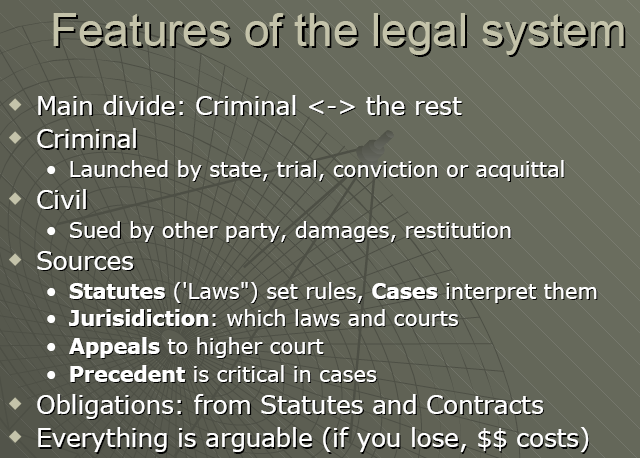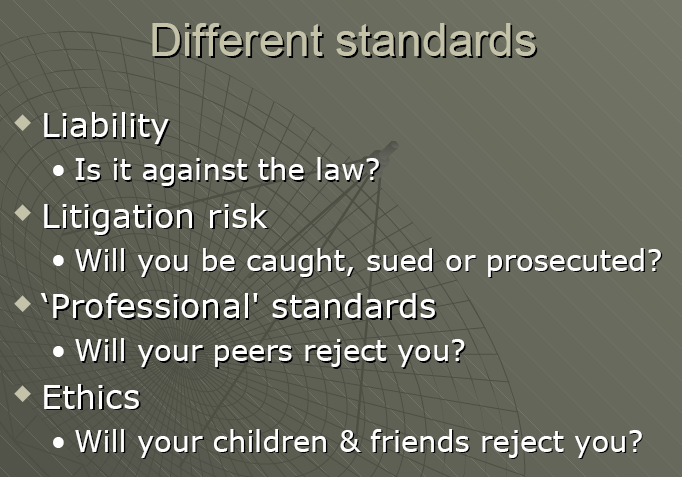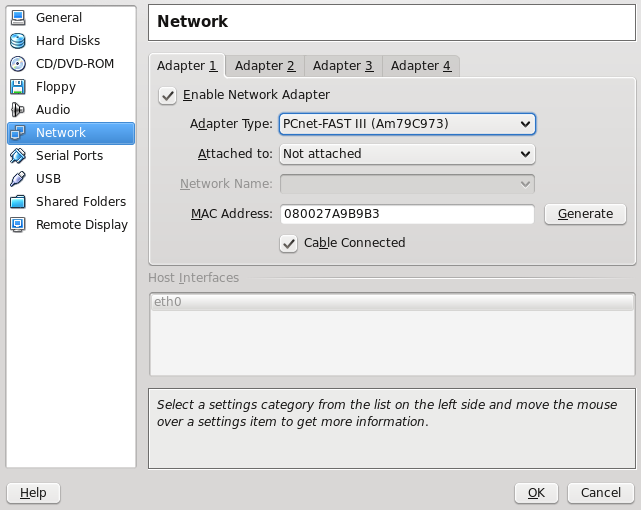Patents
Patents are a business tool.
I think that is the most important thing I gathered from this lecture by two Freehills attorneys (Stuart Irvine & Ronelle Geldenhuys) about IP and software patents. Lecture slides here.
Monopoly vs. Secrecy. In order to get the monopoly you must give up the secrecy.
Patents protect functionality.
Patents can be used as a sword (legal action to get royalties or force the infringer to stop), shield (dissuade others from infringing), war chest (trade and negotiation).
A patent gives the patent owner an exclusive right to exclude others from exploiting (manufacturing or importing a patented product or using or importing a product made by a patented process) an invention in a particular country.
To enforce a patent, the patent owner must take the infringer to court.
Tests for patentability,
- Patentable subject matter
- Industrially applicable
- newness (any prior art?)
- obviousness
With regards to patenting mathematical algorithms,
"A method of calculating a value c, where c = ex x sin(t)" is not patentable however this is,
"A method of determining the length of a road (L) in metres by applying the formula $latex L = \cos \theta \times N \times g^2$ where $latex \theta$ is the gradient of the road, N is the number of litres of fuel used by a car travelling on the road, and g is the acceleration due to gravity”, According to APO, Manual of Practice and Procedure, Volume 2. Sounds a bit silly to me.
An example,
US Pat. 5356330 (via google) - Apparatus for simulating a "high five"

Self publication prior to filing does class as prior art, meaning you cannot get the patent.
To invalidate a patent you just need to find prior art. That is, find the idea published prior to the filing date of the patent. Lesson here, if you know you don't want to get a patent for something and you want it to remain free to the world publish your idea/concept. Remember you don't need something working in order to patent it. Just detail how it would work (that's easier than getting it to work right?).
US patent 5490216 (or via google) is interesting. Filed in 1993, its a System for software registration. Basically there is a demo mode and a full mode. To get the full mode you need a registration key. Thats the general gitz. I didn't read the whole thing.
There are other examples,
- IBM holds patent #4,965,765 which covers the use of different colours to distinguish the nesting level of nested expressions. (Filed: 1986)
- Patent #5,249,290 covers assignment of client requests to the server process having the least load. (Filed: 1991)
- Patent #4,941,125 covers using a digital camera in conjunction with character recognition software to store and index documents on a CD ROM. (Filed: 1984)
I don't know what to think. They seem trivial, simple and obvious, but they weren't published today. As most people would say, you need to ensure that trivial patents are not granted (problem here is how do you define trivial?), and that the term is not too long (20 years is too long in my opinion).
Patenting of illegal methods in not allowed, though you may patent a things which may be used illegally such as gun (heh, otherwise nothing would be patentable).
Interesting example. A safe design was patented and then a thief used the patents to work out how to break it.
-----------------------
Copyright
In terms of software, copyrighting software only stops others from using the same implementation as you. They are free to use an alternate implementation to do the exact same thing.
You can copyright compiled machine code.
I have a lot to say about this (creative/computational universe, and the clouds that span derivative works). So much that I'll have to leave it till later.
-----------------------
Registered Designs
Registered designs are interesting. There is a nice brochure from an Australian Law firm here.
A registered design provides a monopoly of a limited duration (max 10 years in Australia) granted by the government to an entity of a "concept" which determines the appearance of a product. I'm a little confused here as I though (its such a shame that the audio recoding from that lecture is corrupt) Geldenhuys said that registered designs are for a specific device. So if you register a design for an electronic device, anyone can use that design for say a paperweight. However in their lecture slides it says that registered designs protect appearance not functionality.
You will all probably recognise AU Registered Design 307210. Currently owned by Apple Inc. and must expire by Nov 23, 2015.
[caption id="attachment_515" align="aligncenter" width="450" caption="AU Registered Design 307210 (http://pericles.ipaustralia.gov.au/adds2/adds.adds_reps_details.paint_large_rep?p_application_details=200515157,307210,1,BB,tmprod,NORMAL)"]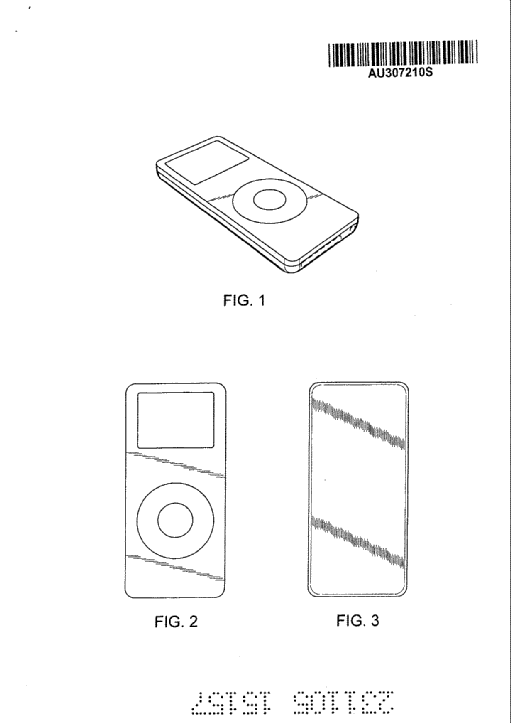 [/caption]
[/caption]
All registered designs must have a "Statement of Newness and Distinctiveness". AU RD 307210 says, "Newness and distinctiveness is claimed in the visual features shown in solid lines in the representations."
Registered designs must be renewed to stay protected. Though they have a max of 10 years, renewal fees get larger near the end of the designs protected life, either Irvine or Geldenhuys then added to this "governments don't like monopolies". Sorry but I strongly disagree with you there. If governments didn't like monopolies they would abolish crown copyright.
Trademarks
I won't say too much here. But here is a sample trade mark "thing"(?).
[caption id="attachment_517" align="aligncenter" width="450" caption="Trade Mark 1111537 (http://pericles.ipaustralia.gov.au/atmoss/Falcon_Details.Print_TM_Details?p_tm_number=1111537&p_ExtDisp=D&p_Detail=DETAILED&p_Search_No=2&p_Lastrecord=FALSE&p_Is_Internal=F)"]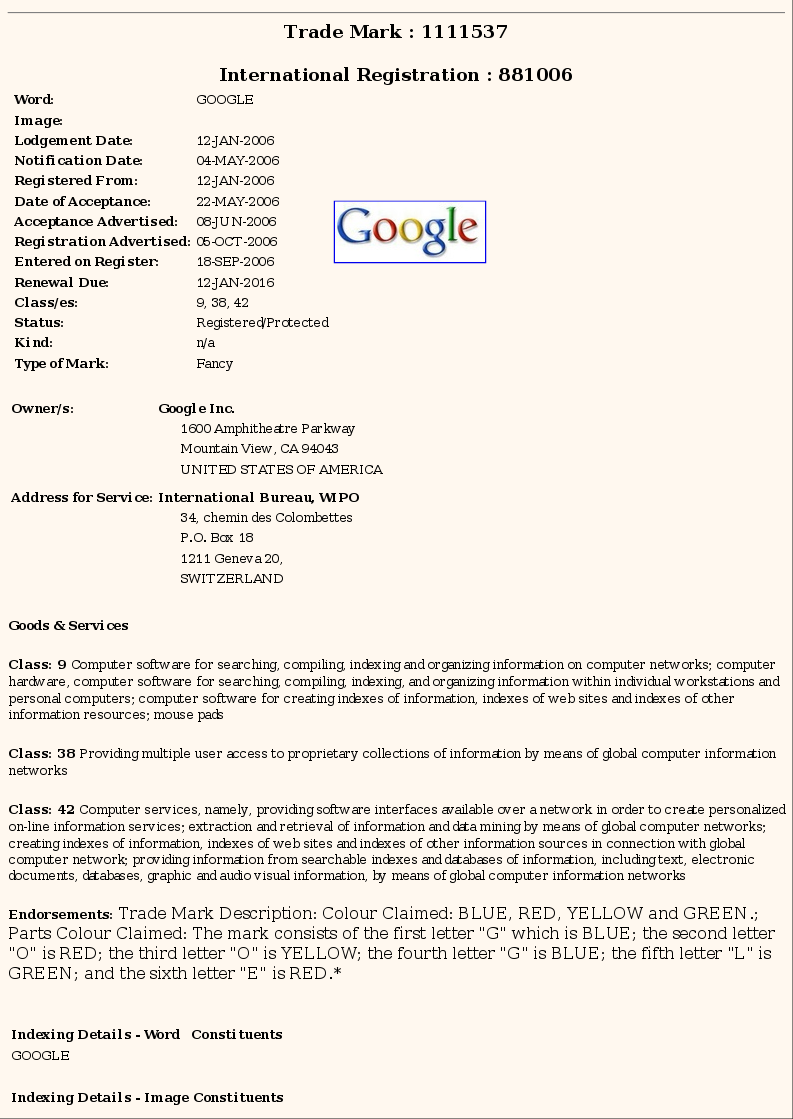 [/caption]
[/caption]
Trade Secrets
You don't publish, you just swear everyone to secrecy (contracts). Does not protect against reverse engineering or independent formulation.


